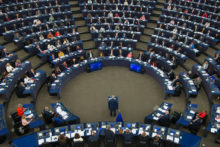CALL FOR PAPERS
DEADLINE EXTENDED UNTIL 30 JANUARY 2019
We are pleased to announce “Power Transitions in Europe and Eurasia,” the 2019 CERES Graduate Student Conference hosted by the Centre for European, Russian, and Eurasian Studies (CERES) at the Munk School of Global Affairs and Public Policy at the University of Toronto. The conference will take place on March 7, 2019 at the Munk School; a keynote address will take place that evening.
The vision for this year’s conference is to bring together interdisciplinary research on regime and state power transitions in Europe and Eurasia between 1900 and the present. During this time, these regions have experienced transformative political, economic, and ethno-cultural power transitions resulting from—and in—two world wars, the Holocaust, the Cold War, and the continued ascendancy of the European Union (EU) in the post-Soviet era. The tumultuous events of the twentieth century forged and fortified Europe’s modern state system and their place in global dynamics of power. Some scholars, such as Francis Fukuyama, believed that the triumph of democracy in Europe and abroad indicated “the end of history.”
However, in today’s Europe, electoral support for populism is now undermining liberal democratic institutions, as witnessed in the Brexit referendum and the rise of so-called illiberal democracy in Central and Eastern Europe. Coupled with these tensions are the multitude of political and demographic changes triggered by the largest migration flows in Europe since the end of World War II. This confluence of related issues already appears to be triggering power transitions, seen perhaps most conspicuously in Chancellor Angela Merkel’s forthcoming departure from her unparalleled leadership roles in Germany and the EU at large. The EU has nevertheless continued to expand its influence, through both the Stabilisation and Association Agreements and the European Neighborhood Policy, to integrate states outside the EU in the European project. In essence, the triumph of democracy is uncertain, and the European political order remains in flux.
We invite paper proposals from current doctoral and master-level students. Proposals may originate in any discipline of the social sciences, humanities or cultural studies, including but not limited to political science, law, sociology, history, literary studies, linguistics, and economics. Students will present their work to fellow students and faculty members. This conference will bring together scholars and practitioners from a variety of disciplines and backgrounds and will include a keynote speaker, panels, and extensive opportunities for discussion. The papers will be published on the CERES website. Accepted papers may be eligible for modest financial assistance to cover travel or accommodation costs on a case by case basis.
For consideration, please submit a short paper proposal (500 words max.) together with a short biography (academic title, affiliation, research interests) by 30 January 2019 to ceresgsu@gmail.com. Please indicate if you require funding to cover travel or accommodation with your proposal submission.
This conference is sponsored in part by the Erasmus+ Programme of the European Union and the German Academic Exchange Service (DAAD).
